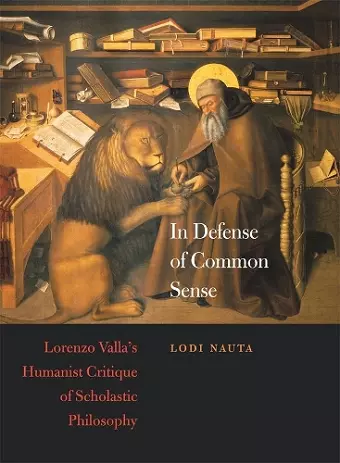In Defense of Common Sense
Lorenzo Valla's Humanist Critique of Scholastic Philosophy
Format:Hardback
Publisher:Harvard University Press
Published:30th Apr '09
Currently unavailable, and unfortunately no date known when it will be back

This is by far the best book in any language on Valla as a philosopher. It will immediately take its place on graduate reading lists and in courses on Renaissance humanism and philosophy, and bring Valla into the narrative of Western philosophical history as no book has previously succeeded in doing. -- James Hankins Harvard University Tremendously impressive. This is a welcome development in scholarship on Valla. Nauta has written a book that will be consulted for a long time to come. -- Christopher Celenza Johns Hopkins University
One of the leading humanists of Quattrocento Italy, Lorenzo Valla (1406–1457) has been praised as a brilliant debunker of medieval scholastic philosophy. In this book Lodi Nauta seeks a more balanced assessment, presenting us with the first comprehensive analysis of the humanist’s attempt at radical reform of Aristotelian scholasticism.
One of the leading humanists of Quattrocento Italy, Lorenzo Valla (ca. 1406–1457) has been praised as a brilliant debunker of medieval scholastic philosophy. In this book Lodi Nauta seeks a more balanced assessment, presenting us with the first comprehensive analysis of the humanist’s attempt at radical reform of Aristotelian scholasticism.
This study examines Valla’s attack on major tenets of Aristotelian metaphysics, showing how Valla employed common sense and linguistic usage as his guides. It then explicates Valla’s critique of Aristotelian psychology and natural philosophy and discusses his moral and religious views, including Valla’s notorious identification of Christian beatitude with Epicurean pleasure and his daring views on the Trinity. Finally, it takes up Valla’s humanist dialectic, which seeks to transform logic into a practical tool measured by persuasiveness and effectiveness.
Nauta firmly places Valla’s arguments and ideas within the contexts of ancient and medieval philosophical traditions as well as renewed interest in ancient rhetoric in the Renaissance. He also demonstrates the relevance of Valla’s conviction that the philosophical problems of the scholastics are rooted in a misunderstanding of language. Combining philosophical exegesis and historical scholarship, this book offers a new approach to a major Renaissance thinker.
This is by far the best book in any language on Valla as a philosopher. It will immediately take its place on graduate reading lists and in courses on Renaissance humanism and philosophy, and bring Valla into the narrative of Western philosophical history as no book has previously succeeded in doing. -- James Hankins * Harvard University *
Tremendously impressive. This is a welcome development in scholarship on Valla. Nauta has written a book that will be consulted for a long time to come. -- Christopher Celenza * Johns Hopkins University *
- Winner of Best Book on the History of Philosophy 2010
- Nominated for Phyllis Goodhart Gordan Book Prize 2010
ISBN: 9780674032699
Dimensions: 235mm x 156mm x 32mm
Weight: 748g
416 pages